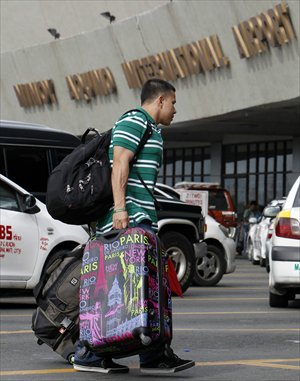HOME >> WORLD
Sea row hurts Philippines
By Zhu Ning in Manila and Wang Zhaokun in Beijing Source:Global Times Published: 2013-6-14 1:28:01

A Filipino migrant worker is seen at Manila's international airport on May 15. Taiwan stopped issuing work visas to Filipinos following the fatal shooting of a Taiwanese fisherman on May 9. Photo: CFP
Aida Mariel, a mother of four, used to receive remittances regularly from her daughter who works at a factory in Taiwan, but she said things were a little different now.
"The family needs money now but we have not received my daughter's remittances lately," Mariel told the Global Times, fearing that if her daughter comes back home, she would not be able to return to Taiwan to work.
Taiwan froze applications for work permits from Filipinos and issued a travel warning for the Philippines after Manila failed to meet Taipei's demands to formally apologize and jointly investigate the shooting of a Taiwanese fisherman by Philippine coastguards.
Judy Ann Miranda, secretary-general of the Partido ng Manggagawa, or Labor Party, told the Global Times that a Philippine worker could only earn an average of 10,000 pesos ($233) at home, while working overseas could bring them twice that amount.
"Philippine workers in Taiwan remit the majority of their money back home. So if all workers in Taiwan are repatriated, that means 87,000 families, or as many as 300,000 people's lives, would be impacted," Miranda said.
Worst case scenario
Compared to the impact brought by the Manila-Taipei dispute, people in the Philippines are even more concerned about the impact on their businesses and lives if the Philippines' ties with the Chinese mainland deteriorate.
The manager of a fruit trading company in Manila that does business with China told the Global Times that he almost went bankrupt last year amid the Beijing-Manila row over Huangyan Island.
"What I feared most is that there would again be flare-up in the relationship between China and the Philippines," he said.
The killing of the Taiwanese fisherman came amid the already simmering island row between China and the Philippines in the South China Sea after Manila insisted on seeking a UN tribunal's arbitration over the dispute despite Beijing's strong opposition.
Philippine investigators said Thursday they had recommended that criminal charges be filed against coastguards involved in the shooting, AFP reported.
A Tuesday report of the Taipei-based Central News Agency (CNA) quoted an anonymous official source close to the investigation as saying that the Philippine coast guard personnel could be charged with "intentional killing."
Analysts believe the shooting incident will prompt China to reinforce its position in the dispute, saying Beijing could put more diplomatic focus on Southeast Asia in an effort to win the understanding of more countries in the area.
Philippine Foreign Secretary Albert del Rosario said his country is determined to pursue arbitration through a UN tribunal in the sea dispute with Beijing and the deliberations will proceed even without the participation of China.
Rosario has said any ruling by the tribunal will be "final and unappealable."
But the results may not be as good as Manila hopes, as China is likely to step up its pressure against the Philippines.
Beijing has accused Manila of trying to legalize its occupation of Chinese islands in the South China Sea by seeking international arbitration.
"The shooting of the Taiwanese fisherman means China is very unlikely to back down from its established position even though it traditionally welcomes bilateral dialogues," Gary Li, a senior analyst with the London-based IHS Fairplay maritime research company, told the Global Times. "It's difficult to see how the arbitration can move forward conclusively without China taking part."
Li said the Philippine government is also likely to pressure China into dialogue again, noting that Manila has left room for more bilateral talks. Rosario said the Philippines "will entertain bilateral discussions" even as the arbitration continues.
Ji Qiufeng, a professor of international relations at Nanjing University, told the Global Times that an arbitration process could take many years. "China can do a lot of work to stop the process. It is unrealistic for the Philippines to expect a quick ruling in their favor," Ji said.
And even if the tribunal ruled against China, Beijing would definitely choose to ignore the arbitration.
In that case, the UN tribunal has to consider the precedent this sets for other disputes, Yuan Jindong, an associate professor specializing in Asia-Pacific security with the University of Sydney, told the Global Times.
"So the question is whether you want to proceed with a ruling not accepted by China and basically concede that the tribunal rules do not count," Yuan said.
Beijing's focus
But although China does not have to worry about a UN tribunal ruling against it, analysts suggest Beijing put more focus on Southeast Asia in a strategy that could both win understanding of its position on sovereignty issues and demonstrate its willingness to find peaceful solutions.
And in a sign of just such a shift, China's new foreign minister Wang Yi last month chose Southeast Asia as the destination his first overseas trip since taking office in March, even though Africa used to be the choice for newly appointed Chinese foreign ministers.
"China-ASEAN relations have experienced some problems over the past few years and therefore require more attention. Territorial disputes certainly stand out as an important issue," Yuan said, stressing that China needs to do more to assure ASEAN countries that it desires cordial relations with the organization and its member states.
"China will also need to develop a strategy that reinforces its positions on sovereignty issues but at the same time appear controlled, composed, and willing to seek solutions through peaceful means," he added. "Anyway, half of the ASEAN countries do not have any territorial issues with China and therefore their continuing neutrality would be important."
Posted in: Asia-Pacific, Asia in Focus